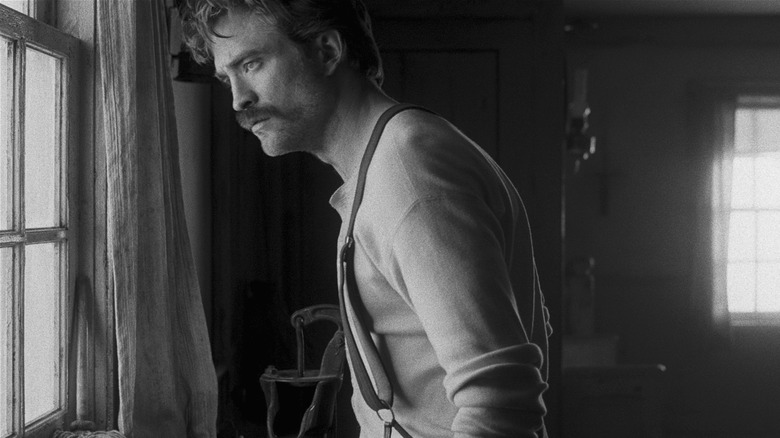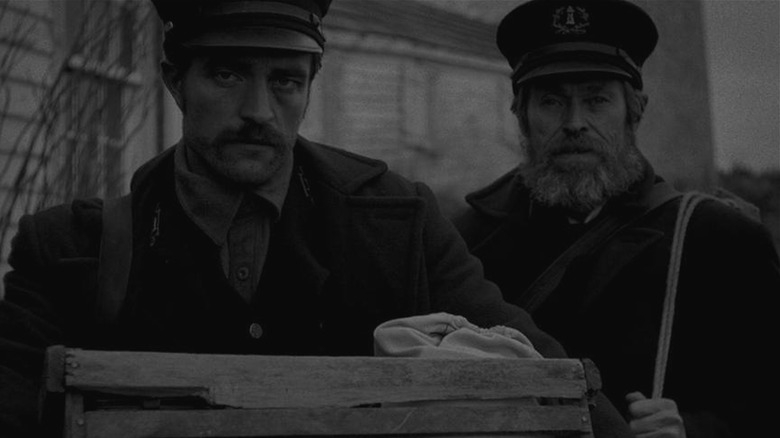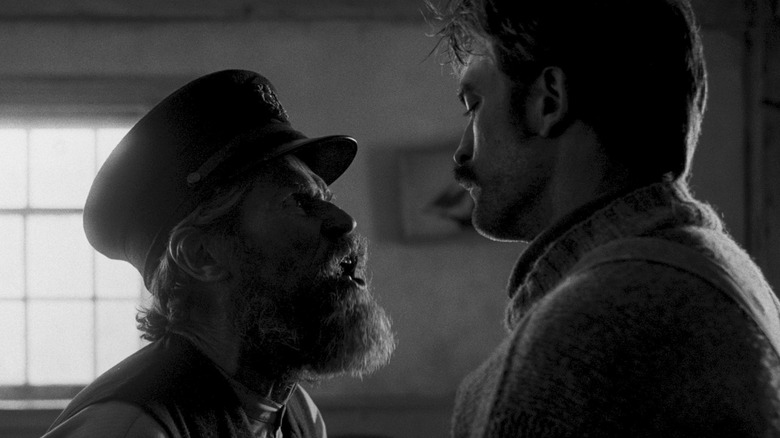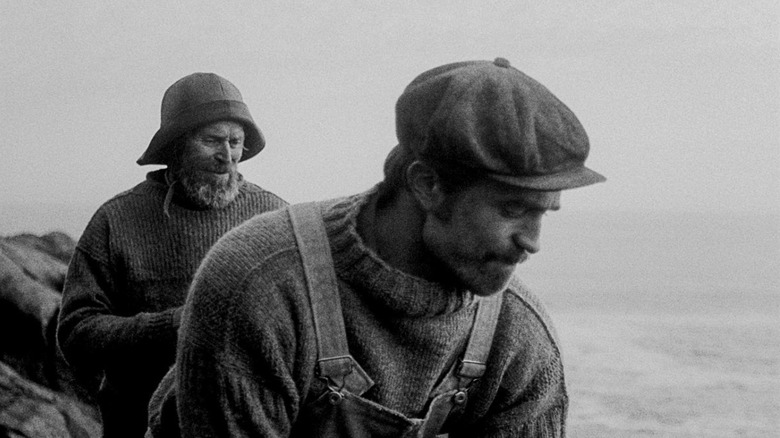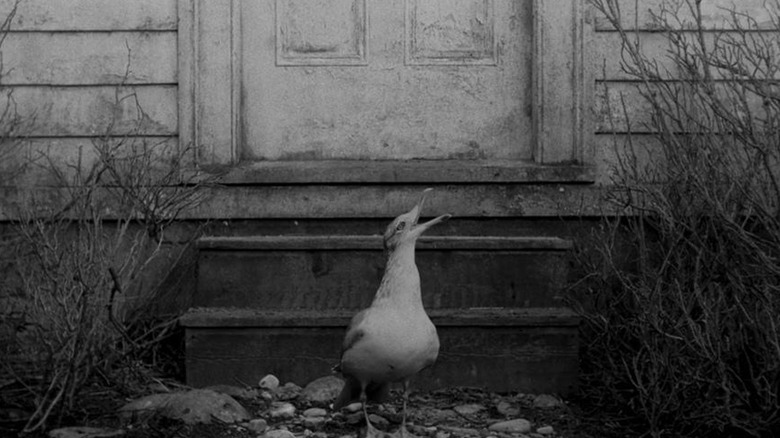The Lighthouse Ending Explained: Prometheus, Unbound
In Greek mythology, after the Titan Prometheus enraged the god Zeus by stealing fire and gifting it to mankind, Zeus chained him to a rock, while an eagle devoured Prometheus' liver for eternity. Such was the price the Titan had to pay for his so-called transgression, and with the discovery of fire, mankind undoubtedly shifted to its next phase of civilization. Robert Eggers' haunting, intense "The Lighthouse" ends by embodying Prometheus' fate within a layered allegory: The lifeless body of Ephraim Winslow (Robert Pattinson) lies on the beach, his entrails being consumed by pecking seagulls ad infinitum. It's a haunting image that feels disturbingly final, charged with interlinked symbolism that bleeds into one another as the film crawls to its horrifying end.
"The Lighthouse" encapsulates the endless vistas of the human experience that flit between defensive and tender, vulnerable and murderous, finally descending into a destructive brand of madness. The setting, a lone lighthouse in the middle of nowhere, is meant to evoke feelings of claustrophobia, where complete isolation feels more tempting than being perceived by someone who can see right through you. Winslow, who later reveals himself to be Thomas Howard, attempts to guard his core motivations in vain — the older man, Thomas Wake (Willem Dafoe) looms like a Protean sea deity with access to knowledge that is beyond Winslow/Howard's reach.
This disparity in power leads to a constant push and pull, birthing a dynamic capable of being sincerely sweet and dizzyingly vitriolic within a few seconds. While Wake and Winslow's dynamic is the beating heart of "The Lighthouse," the film also dives into the turgid waters of hubris, alienation, and all-consuming guilt while ending on the cautionary note of history repeating itself.
What you need to remember about the plot of The Lighthouse
Stationed to man a lighthouse on an island off the coast of New England, Thomas Wake and Ephraim Winslow need to put their differences aside in order to do their jobs as wickies. However, this relationship is strained from the get-go. Wake commands Winslow to do all the menial labor alone, ordering him to empty his chamber pots and lug heavy kerosene jars up the lighthouse stairs. The two men seem to have almost nothing in common and even less reason to be friendly with one another, but the intensity of this dynamic unravels when the two get drunk and confess their sins to one other, while constantly squabbling about everything, from personal crosses they have to bear to complaints about the other's cooking.
On a literal level, Ephraim confronts Winslow about his controlling behavior and demands to know several truths, including the fate of the wickie who assisted Wake before Winslow, and what secrets lie at the top of the lighthouse. The heated arguments give way to violence, and Winslow is able to overpower Wake and assert authority for the first time, putting him on a leash before burying the older man alive. While Wake resurrects, Winslow kills the man for good with a shovel and makes his way to the forbidden light at the top, which reveals the beauty and horror of a truth beyond human comprehension. Then comes the fall, the cost of such terrible knowledge, as we see Winslow tumble down the stairs and be pecked to death by seagulls, whom Winslow had wronged at one point in the film, despite being warned of the repercussions of doing so.
The cost of overreaching in the end
Winslow's fall to such an ignoble death has conscious parallels to the myth of Icarus, who flew too close to the sun in an act of miscalculated hubris. The interconnected influence of Greek myths and literary tropes makes a single interpretation of the ending impossible — if anything, "The Lighthouse" is meant to make us ponder our relation to these universal emotions, and arrive at conclusions tinted by individual philosophical leanings and worldviews. However, if we are to analyze it within the context of the Promethean themes that permeate the film, it's clear Emphraim's downfall is caused by an act of theft, wherein he dared to covet knowledge that was deemed forbidden for a reason.
But just like multiple interpretations of the Promethean myth — some view Prometheus as a wronged hero, while others perceive his tortuous punishment as just — Winslow's fate can perceived a number of ways. His mistreatment at the hands of Wake gives rise to rightful anger, mixed with lingering guilt due to a past he wishes to run away from. This, combined with the psychological toll of isolation, causes Winslow to lash out and redefine the status quo, ending in violence and a claim over the authority of being a lighthouse keeper with access to the heart of the depths, and the secrets it holds.
The symbolism is fitting, as Wake's Proteus, who delivers a "Hark, Triton!" monologue at one point to cement his connections to myth, is buried alive due to his callous abuse of power. While Winslow ends up experiencing a knowledge that makes him giddy and delirious with a sense of power, he's punished for his hubris, smote by the gods for such extreme, irreverent ambition.
Guilt and other repressed emotions
A Freudian reading of "The Lighthouse" is not too far-fetched, as perceiving Wake and Winslow as warring aspects of the same psyche puts several things into perspective. Wake is world-weary and self-assured to the point of arrogance, giving into his base instincts without regard for social norms or expectations, which molds him as the "id" in this equation. On the other hand, Winslow represents the "ego," constantly attempting to mediate between his intrusive thoughts and expected civility, eager to fashion a new identity that will allow him to be perceived as morally sound. This is where guilt upsets the already-strained status quo between the id and the ego, causing the ego to violently repress the id in favor of a possible salvation: the "enchantment" in the light at the top of the lighthouse.
These repressed emotions often assume a sexual tint, especially during the scenes in which Winslow masturbates to the scrimshaw mermaid and experiences a tryst with the shrieking siren who haunts his waking visions. There are Oedipal undertones here too, as Wake and Winslow's dynamic often teeters on the edge of homoeroticism, revealing a tenderness that feels sweet in the midst of raging internal storms. Pattinson spoke to HuffPost about this interpretation, talking about Winslow's phallic envy and repressed desires, where he "sort of wants a daddy" when navigating his dynamic with Wake. As guilt looms large over both men, they give into madness, creating a space that is as sacred as it is volatile, where Winslow and Wake are on the verge of kissing one minute, and in the next, they are at each other's throats, consumed by traditional expressions of toxic masculinity that they're unable to escape even in a space that feels so liminal.
Bearing the cross of our sins
The unease that permeates throughout "The Lighthouse," shot in the 1:19:1 aspect ratio and monochrome cinematography, culminates in the ending, where the seagulls are the only ones that remain in a harsh and unforgiving landscape. Earlier in the film, when Winslow is irked by a seagull, Wake warns him to not harm the birds, as they are believed to be the souls of lost sailors. While this might feel like a symbolic tie-in, the seagulls echo the literary symbolism associated with the albatross in Samuel Coleridge's "The Rime of the Ancient Mariner," where the bird represents guilt that weighs upon the soul to the point of becoming a curse.
In the poem, the slaying of an innocent albatross gradually kills the crew of a ship after a stretch of horrible ill luck, with the image of an albatross around the neck symbolizing a metaphorical noose that tightens due to a guilty conscience. Winslow's guilt triggers the weight of his sins, prompting him to lash out at the seagulls, who remind him of this terrible weight. Even before Winslow looks into the light at the top, he seals his fate by brutally killing a seagull in a fit of rage. Just like in the poem, this cruel act against nature invokes its wrath, and the two men are consumed by a raging storm, without and within.
In essence, Winslow's fate accommodates multifaceted interpretations, but all possible themes tie back to identity, and the cost of shaping one's sense of self amid a web of complex, tangled sentiments that highlight the relationship between Eros (desire) and Thanatos (death). Everything else exists in between, lost in the roar of the crashing waves and the inescapable lull of the light.
